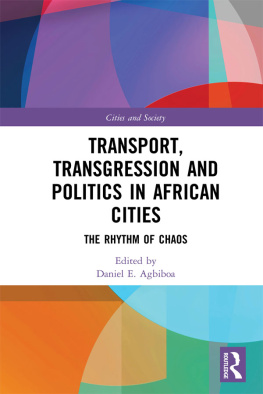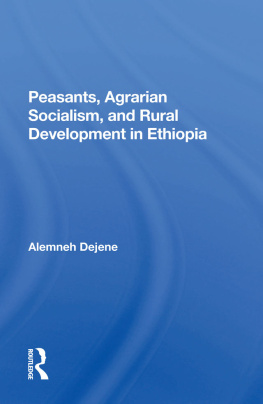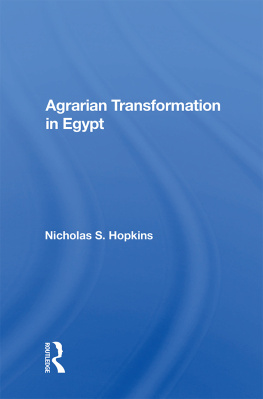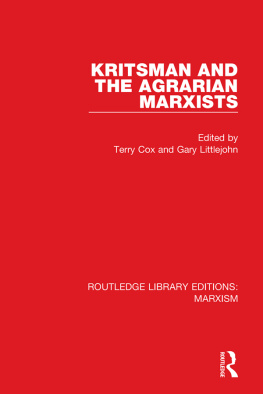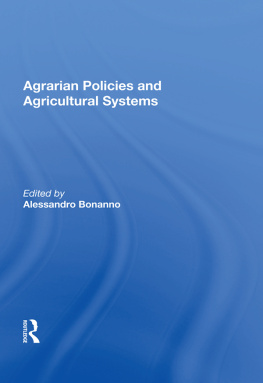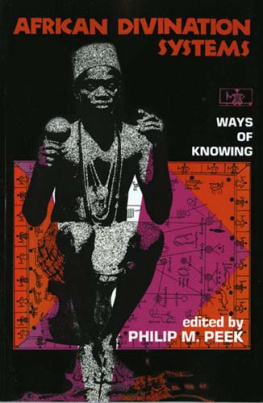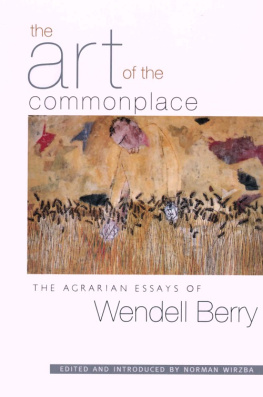AFRICAN ETHNOGRAPHIC STUDIES
OF THE 20TH CENTURY
Volume 7
AFRICAN AGRARIAN SYSTEMS
AFRICAN AGRARIAN SYSTEMS
Edited by
DANIEL BIEBUYCK
First published in 1963 by Oxford University Press for the International African Institute.
This edition first published in 2018
by Routledge
2 Park Square, Milton Park, Abingdon, Oxon OX14 4RN
and by Routledge
711 Third Avenue, New York, NY 10017
Routledge is an imprint of the Taylor & Francis Group, an informa business
1963 International African Institute
All rights reserved. No part of this book may be reprinted or reproduced or utilised in any form or by any electronic, mechanical, or other means, now known or hereafter invented, including photocopying and recording, or in any information storage or retrieval system, without permission in writing from the publishers.
Trademark notice: Product or corporate names may be trademarks or registered trademarks, and are used only for identification and explanation without intent to infringe.
British Library Cataloguing in Publication Data
A catalogue record for this book is available from the British Library
ISBN: 978-0-8153-8713-8(Set)
ISBN: 978-0-429-48813-9 (Set) (ebk)
ISBN: 978-1-138-48935-6 (Volume 7) (hbk)
ISBN: 978-1-351-03766-2 (Volume 7) (ebk)
Publishers Note
The publisher has gone to great lengths to ensure the quality of this reprint but points out that some imperfections in the original copies may be apparent.
Disclaimer
The publisher has made every effort to trace copyright holders and would welcome correspondence from those they have been unable to trace.
Due to modern production methods, it has not been possible to reproduce the fold-out maps within the book. Please visit www.routledge.com to view them.
AFRICAN AGRARIAN SYSTEMS
STUDIES PRESENTED AND DISCUSSED AT THE
SECOND INTERNATIONAL AFRICAN SEMINAR,
LOVANIUM UNIVERSITY, LEOPOLDVILLE,
JANUARY I960
Edited with an introduction by
DANIEL BIEBUYCK
Foreword by
DARYLL FORDE
Published for the
INTERNATIONAL AFRICAN INSTITUTE
by the
OXFORD UNIVERSITY PRESS
1963
CONTENTS
Oxford University Press, Amen House, London E.C.4
GLASGOW NEW YORK TORONTO MELBOURNE WELLINGTON
BOMBAY CALCUTTA MADRAS KARACHI LAHORE DACCA
CAPE TOWN SALISBURY NAIROBI IBADAN ACCRA
KUALA LUMPUR HONG KONG
International African Institute 1963
Printed in Great Britain
LIST OF MAPS
Area of Southern Akim Abuakwa
II. Nankese-Shai Company (folding chart)
Farm Plan of Aburi Community near Domi
IV. The Imenti Sub-tribe of the Meru (Kenya) (folding chart)
Coffee and Cocoa Farms of Guzhoa
Coffee Farms of Tirpoko
Rpartition des peuplements de palmier huile au Dahomey
Extrait de la carte dresse par la Mission de lOum: rgion de Mitro
The second of the series of seminars organised by the International African Institute with the aid of a grant from the Ford Foundation was held at Lovanium University over a ten-day period in January 1960 under the chairmanship of Professor Daniel Biebuyck, the Head of its Department of Anthropology. This seminar was planned to afford an opportunity of thorough discussion of existing knowledge concerning land rights and land use in Africa with reference to technical, economic and administrative factors. It sought to assess the social contexts of traditional and changing conditions in this field. Thus the discussions centred on a comparison of the various systems of land holding, the factors that accounted for their differentiation and in particular on the recent changes that were taking place as part of a more general adaptation to modern conditions. The significance of the wide range of technical, political, economic and religious aspects was brought repeatedly to the attention of the seminar group as its members analysed different systems and conditions with which they had intimate experience in the field.
Collectively the participants brought together a wide experience of African agricultural conditions, both physical and cultural, extending from Senegal to the Transkei and from commercial cocoa farmers to isolated and self-contained forest villages in the eastern Congo. Each prepared for advance circulation a study based on personal field experience of some aspect of the subject. But, diverse as were the data, all sought to distinguish and evaluate the factors and processes by which an agrarian system was shaped or, as so often, was being modified as part of a wider process of change. This series of papers, substantially revised in some instances following the discussions at the meeting, forms the greater part of the present volume.
At the sessions of the seminar more general and comparative topics were successively taken up for discussion on the basis of the material presented in the papers and other studies bearing on these topics. Thus reviews were made of conflicts between customary law on the one hand and territorial law and government regulations on the other; of the interrelations between changes in status systems and the exercise of rights in land; of the economic and social effects of the increases in land values and of the procedures involved in securing the adaptation of traditional systems to modern needs as well as of the economic and social problems set by these.
From the record of the discussions and supplementary material kindly provided by participants, Professor Biebuyck has prepared for this volume an introduction which surveys the main findings and points of view which found expression at the seminar. This survey will, I believe, provide a generally useful outline of the broad features of the contemporary agrarian scene in Africa, and a ready means of gaining insight concerning the diversity of conditions and the underlying factors which account not only for much of recent history but also for the nature of the problems and opportunities which lie before the peoples of Africa. For the energy, tact and breadth of outlook with which he conducted the meetings and prepared the preliminary reports, as well as for this valuable introductory survey, the International African Institute and the participants in the seminar are greatly indebted to Professor Biebuyck.
The Institute is also most grateful to all those who accepted invitations to participate in the seminar, both for the valuable new material which they presented in their papers and for the energy and thoroughness with which the discussions were pursued. It also wishes to express its appreciation to the University of Lovanium and its Rector, Mgr. Gillon, for generously providing facilities for holding the seminar at a time when this young University, which is fortunately surmounting the stresses and difficulties which were so soon to encompass it, had only just embarked on its first phase of development.
The papers contributed to the seminar were variously presented in French or in English. It has not been possible to provide for their publication fully in both these languages, and they are presented here in the original texts. But a fairly full summary in the other language is given at the end of each paper. A long English summary has similarly been prepared to follow the French text of Professor Biebuycks introductory survey. It is hoped in this way to make the material presented and the outcome of the discussions at this seminar as widely and readily available as possible. The welcome given to the volume on




